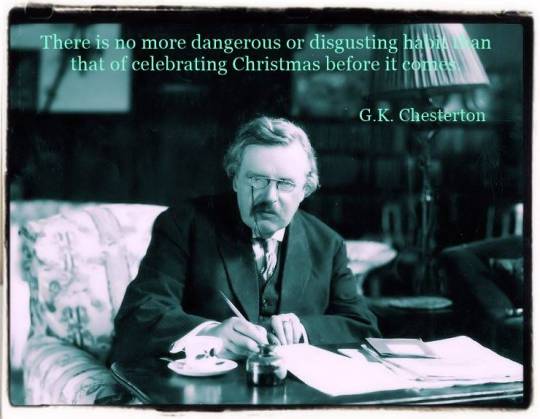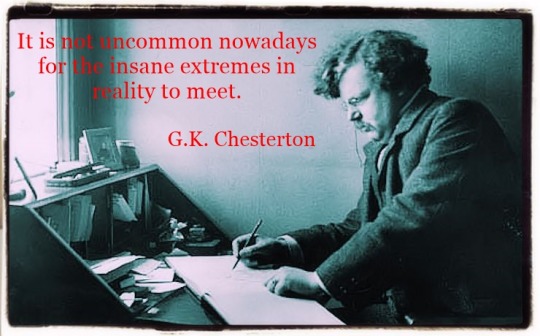#allthingsconsidered
Text
On Christmas


An Essay on Christmas by G.K. Chesterton
On Christmas an essay by G. K. Chesterton from All Things Considered, London 1908, plus some links to other posts about Christmas Festival, markets and stories
What life and death may be to a turkey is not my business; but the soul of Scrooge and the body of Cratchit are my business.
G.K. Chesterton
Any one thinking of the Holy Child as born in December would mean by it exactly what we mean by it; that Christ is not merely a summer sun of the prosperous but a winter fire for the unfortunate.
G.K. Chesterton
The great majority of people will go on observing forms that cannot be explained; they will keep Christmas Day with Christmas gifts and Christmas benedictions; they will continue to do it; and some day suddenly wake up and discover why.
G.K. Chesterton
Christmas is built upon a beautiful and intentional paradox; that the birth of the homeless should be celebrated in every home.
G. K. Chesterton
There is no more dangerous or disgusting habit than that of celebrating Christmas before it comes, as I am doing in this article. It is the very essence of a festival that it breaks upon one brilliantly and abruptly, that at one moment the great day is not and the next moment the great day is. Up to a certain specific instant you are feeling ordinary and sad; for it is only Wednesday. At the next moment your heart leaps up and your soul and body dance together like lovers; for in one burst and blaze it has become Thursday. I am assuming (of course) that you are a worshipper of Thor, and that you celebrate his day once a week, possibly with human sacrifice. If, on the other hand, you are a modern Christian Englishman, you hail (of course) with the same explosion of gaiety the appearance of the English Sunday. But I say that whatever the day is that is to you festive or symbolic, it is essential that there should be a quite clear black line between it and the time going before. And all the old wholesome customs in connection with Christmas were to the effect that one should not touch or see or know or speak of something before the actual coming of Christmas Day. Thus, for instance, children were never given their presents until the actual coming of the appointed hour. The presents were kept tied up in brown-paper parcels, out of which an arm of a doll or the leg of a donkey sometimes accidentally stuck. I wish this principle were adopted in respect of modern Christmas ceremonies and publications. Especially it ought to be observed in connection with what are called the Christmas numbers of magazines. The editors of the magazines bring out their Christmas numbers so long before the time that the reader is more likely to be still lamenting for the turkey of last year than to have seriously settled down to a solid anticipation of the turkey which is to come. Christmas numbers of magazines ought to be tied up in brown paper and kept for Christmas Day. On consideration, I should favour the editors being tied up in brown paper. Whether the leg or arm of an editor should ever be allowed to protrude I leave to individual choice.
Of course, all this secrecy about Christmas is merely sentimental and ceremonial; if you do not like what is sentimental and ceremonial, do not celebrate Christmas at all. You will not be punished if you don't; also, since we are no longer ruled by those sturdy Puritans who won for us civil and religious liberty, you will not even be punished if you do. But I cannot understand why any one should bother about a ceremonial except ceremonially. If a thing only exists in order to be graceful, do it gracefully or do not do it. If a thing only exists as something professing to be solemn, do it solemnly or do not do it. There is no sense in doing it slouchingly; nor is there even any liberty. I can understand the man who takes off his hat to a lady because it is the customary symbol. I can understand him, I say; in fact, I know him quite intimately. I can also understand the man who refuses to take off his hat to a lady, like the old Quakers, because he thinks that a symbol is superstition. But what point would there be in so performing an arbitrary form of respect that it was not a form of respect? We respect the gentleman who takes off his hat to the lady; we respect the fanatic who will not take off his hat to the lady. But what should we think of the man who kept his hands in his pockets and asked the lady to take his hat off for him because he felt tired?
This is combining insolence and superstition; and the modern world is full of the strange combination. There is no mark of the immense weak-mindedness of modernity that is more striking than this general disposition to keep up old forms, but to keep them up informally and feebly. Why take something which was only meant to be respectful and preserve it disrespectfully? Why take something which you could easily abolish as a superstition and carefully perpetuate it as a bore? There have been many instances of this half-witted compromise. Was it not true, for instance, that the other day some mad American was trying to buy Glastonbury Abbey and transfer it stone by stone to America? Such things are not only illogical, but idiotic. There is no particular reason why a pushing American financier should pay respect to Glastonbury Abbey at all. But if he is to pay respect to Glastonbury Abbey, he must pay respect to Glastonbury. If it is a matter of sentiment, why should he spoil the scene? If it is not a matter of sentiment, why should he ever have visited the scene? To call this kind of thing Vandalism is a very inadequate and unfair description. The Vandals were very sensible people. They did not believe in a religion, and so they insulted it; they did not see any use for certain buildings, and so they knocked them down. But they were not such fools as to encumber their march with the fragments of the edifice they had themselves spoilt. They were at least superior to the modern American mode of reasoning. They did not desecrate the stones because they held them sacred.

It is not uncommon nowadays for the insane extremes in reality to meet. G.K. Chesterton
Another instance of the same illogicality I observed the other day at some kind of "At Home." I saw what appeared to be a human being dressed in a black evening-coat, black dress-waistcoat, and black dress-trousers, but with a shirt-front made of Jaegar wool. What can be the sense of this sort of thing? If a man thinks hygiene more important than convention (a selfish and heathen view, for the beasts that perish are more hygienic than man, and man is only above them because he is more conventional), if, I say, a man thinks that hygiene is more important than convention, what on earth is there to oblige him to wear a shirt-front at all? But to take a costume of which the only conceivable cause or advantage is that it is a sort of uniform, and then not wear it in the uniform way—this is to be neither a Bohemian nor a gentleman. It is a foolish affectation, I think, in an English officer of the Life Guards never to wear his uniform if he can help it. But it would be more foolish still if he showed himself about town in a scarlet coat and a Jaeger breast-plate. It is the custom nowadays to have Ritual Commissions and Ritual Reports to make rather unmeaning compromises in the ceremonial of the Church of England. So perhaps we shall have an ecclesiastical compromise by which all the Bishops shall wear Jaeger copes and Jaeger mitres. Similarly the King might insist on having a Jaeger crown. But I do not think he will, for he understands the logic of the matter better than that. The modern monarch, like a reasonable fellow, wears his crown as seldom as he can; but if he does it at all, then the only point of a crown is that it is a crown. So let me assure the unknown gentleman in the woollen vesture that the only point of a white shirt-front is that it is a white shirt-front. Stiffness may be its impossible defect; but it is certainly its only possible merit.
Let us be consistent, therefore, about Christmas, and either keep customs or not keep them. If you do not like sentiment and symbolism, you do not like Christmas; go away and celebrate something else; I should suggest the birthday of Mr. M'Cabe. No doubt you could have a sort of scientific Christmas with a hygienic pudding and highly instructive presents stuffed into a Jaeger stocking; go and have it then. If you like those things, doubtless you are a good sort of fellow, and your intentions are excellent. I have no doubt that you are really interested in humanity; but I cannot think that humanity will ever be much interested in you. Humanity is unhygienic from its very nature and beginning. It is so much an exception in Nature that the laws of Nature really mean nothing to it. Now Christmas is attacked also on the humanitarian ground. Ouida called it a feast of slaughter and gluttony. Mr. Shaw suggested that it was invented by poulterers. That should be considered before it becomes more considerable.
I do not know whether an animal killed at Christmas has had a better or a worse time than it would have had if there had been no Christmas or no Christmas dinners. But I do know that the fighting and suffering brotherhood to which I belong and owe everything, Mankind, would have a much worse time if there were no such thing as Christmas or Christmas dinners. Whether the turkey which Scrooge gave to Bob Cratchit had experienced a lovelier or more melancholy career than that of less attractive turkeys is a subject upon which I cannot even conjecture. But that Scrooge was better for giving the turkey and Cratchit happier for getting it I know as two facts, as I know that I have two feet. What life and death may be to a turkey is not my business; but the soul of Scrooge and the body of Cratchit are my business. Nothing shall induce me to darken human homes, to destroy human festivities, to insult human gifts and human benefactions for the sake of some hypothetical knowledge which Nature curtained from our eyes. We men and women are all in the same boat, upon a stormy sea. We owe to each other a terrible and tragic loyalty. If we catch sharks for food, let them be killed most mercifully; let any one who likes love the sharks, and pet the sharks, and tie ribbons round their necks and give them sugar and teach them to dance. But if once a man suggests that a shark is to be valued against a sailor, or that the poor shark might be permitted to bite off a nigger's leg occasionally; then I would court-martial the man—he is a traitor to the ship.
And while I take this view of humanitarianism of the anti-Christmas kind, it is cogent to say that I am a strong anti-vivisectionist. That is, if there is any vivisection, I am against it. I am against the cutting-up of conscious dogs for the same reason that I am in favour of the eating of dead turkeys. The connection may not be obvious; but that is because of the strangely unhealthy condition of modern thought. I am against cruel vivisection as I am against a cruel anti-Christmas asceticism, because they both involve the upsetting of existing fellowships and the shocking of normal good feelings for the sake of something that is intellectual, fanciful, and remote. It is not a human thing, it is not a humane thing, when you see a poor woman staring hungrily at a bloater, to think, not of the obvious feelings of the woman, but of the unimaginable feelings of the deceased bloater. Similarly, it is not human, it is not humane, when you look at a dog to think about what theoretic discoveries you might possibly make if you were allowed to bore a hole in his head. Both the humanitarians' fancy about the feelings concealed inside the bloater, and the vivisectionists' fancy about the knowledge concealed inside the dog, are unhealthy fancies, because they upset a human sanity that is certain for the sake of something that is of necessity uncertain. The vivisectionist, for the sake of doing something that may or may not be useful, does something that certainly is horrible. The anti-Christmas humanitarian, in seeking to have a sympathy with a turkey which no man can have with a turkey, loses the sympathy he has already with the happiness of millions of the poor.
It is not uncommon nowadays for the insane extremes in reality to meet. Thus I have always felt that brutal Imperialism and Tolstoian non-resistance were not only not opposite, but were the same thing. They are the same contemptible thought that conquest cannot be resisted, looked at from the two standpoints of the conqueror and the conquered. Thus again teetotalism and the really degraded gin-selling and dram-drinking have exactly the same moral philosophy. They are both based on the idea that fermented liquor is not a drink, but a drug. But I am specially certain that the extreme of vegetarian humanity is, as I have said, akin to the extreme of scientific cruelty—they both permit a dubious speculation to interfere with their ordinary charity. The sound moral rule in such matters as vivisection always presents itself to me in this way. There is no ethical necessity more essential and vital than this: that casuistical exceptions, though admitted, should be admitted as exceptions. And it follows from this, I think, that, though we may do a horrid thing in a horrid situation, we must be quite certain that we actually and already are in that situation. Thus, all sane moralists admit that one may sometimes tell a lie; but no sane moralist would approve of telling a little boy to practise telling lies, in case he might one day have to tell a justifiable one. Thus, morality has often justified shooting a robber or a burglar. But it would not justify going into the village Sunday school and shooting all the little boys who looked as if they might grow up into burglars. The need may arise; but the need must have arisen. It seems to me quite clear that if you step across this limit you step off a precipice.

Christmas decorations
Now, whether torturing an animal is or is not an immoral thing, it is, at least, a dreadful thing. It belongs to the order of exceptional and even desperate acts. Except for some extraordinary reason I would not grievously hurt an animal; with an extraordinary reason I would grievously hurt him. If (for example) a mad elephant were pursuing me and my family, and I could only shoot him so that he would die in agony, he would have to die in agony. But the elephant would be there. I would not do it to a hypothetical elephant. Now, it always seems to me that this is the weak point in the ordinary vivisectionist argument, "Suppose your wife were dying." Vivisection is not done by a man whose wife is dying. If it were it might be lifted to the level of the moment, as would be lying or stealing bread, or any other ugly action. But this ugly action is done in cold blood, at leisure, by men who are not sure that it will be of any use to anybody—men of whom the most that can be said is that they may conceivably make the beginnings of some discovery which may perhaps save the life of some one else's wife in some remote future. That is too cold and distant to rob an act of its immediate horror. That is like training the child to tell lies for the sake of some great dilemma that may never come to him. You are doing a cruel thing, but not with enough passion to make it a kindly one.
So much for why I am an anti-vivisectionist; and I should like to say, in conclusion, that all other anti-vivisectionists of my acquaintance weaken their case infinitely by forming this attack on a scientific speciality in which the human heart is commonly on their side, with attacks upon universal human customs in which the human heart is not at all on their side. I have heard humanitarians, for instance, speak of vivisection and field sports as if they were the same kind of thing. The difference seems to me simple and enormous. In sport a man goes into a wood and mixes with the existing life of that wood; becomes a destroyer only in the simple and healthy sense in which all the creatures are destroyers; becomes for one moment to them what they are to him - another animal. In vivisection a man takes a simpler creature and subjects it to subtleties which no one but man could inflict on him, and for which man is therefore gravely and terribly responsible.
Meanwhile, it remains true that I shall eat a great deal of turkey this Christmas; and it is not in the least true (as the vegetarians say) that I shall do it because I do not realise what I am doing, or because I do what I know is wrong, or that I do it with shame or doubt or a fundamental unrest of conscience. In one sense I know quite well what I am doing; in another sense I know quite well that I know not what I do. Scrooge and the Cratchits and I are, as I have said, all in one boat; the turkey and I are, to say the most of it, ships that pass in the night, and greet each other in passing. I wish him well; but it is really practically impossible to discover whether I treat him well. I can avoid, and I do avoid with horror, all special and artificial tormenting of him, sticking pins in him for fun or sticking knives in him for scientific investigation. But whether by feeding him slowly and killing him quickly for the needs of my brethren, I have improved in his own solemn eyes his own strange and separate destiny, whether I have made him in the sight of God a slave or a martyr, or one whom the gods love and who die young—that is far more removed from my possibilities of knowledge than the most abstruse intricacies of mysticism or theology. A turkey is more occult and awful than all the angels and archangels In so far as God has partly revealed to us an angelic world, he has partly told us what an angel means. But God has never told us what a turkey means. And if you go and stare at a live turkey for an hour or two, you will find by the end of it that the enigma has rather increased than diminished.
"Christmas" from All Things Considered. G.K. Chesterton. London: Methuen & Co., 1908.
Read also:
Christmas quotes ;
60 great Christmas quotes ;
Christmas markets in England ;
Christmas markets in America ;
Christmas
Read the full article
#AllThingsConsidered#anti-Christmas#celebrating#charity#Chesterton#Christmas#Cratchit#death#dinners#essay#G.K.Chesterton#humanitarianism#life#people#Scrooge#superstition#Turkey#world
0 notes
Text
Dvorak may have been a narodnik (populist), applying similar ideas as the Kuchka composers but to American music 🤔
[All Things Considered] Dvorak's beloved 'New World' symphony was an anthem to what American music could be #allThingsConsidered
https://podcastaddict.com/all-things-considered/episode/160353529 via @PodcastAddict
0 notes
Photo

Listen to some #theloniousmonk today in honor of this musical geniuses birthday. My favorite Monk song of all time is the piano solo rendition of Round About Midnight which he composed in 1944 and quickly became a Jazz standard. If you'd like a quick Monk synopsis, listen to this 7min feature done for #npr a few years ago on his centennial titled After Midnight for All Things Considered #nowplaying #jazzpiano #roundmidnight #allthingsconsidered https://www.instagram.com/p/CU2lY3LF2StseBmWEoos4pwn7gVW2Tx4LFtD2Q0/?utm_medium=tumblr
1 note
·
View note
Text
Honoring Michael Collins, Apollo Astronaut
Apollo 11 Command Module Pilot Michael Collins, sometimes referred to as “the forgotten astronaut” of that historic moon mission, died this week after a battle with cancer. Listen to the NPR remembrance on All Things Considered, April 28, 2021.

The photo above of Apollo 11 commander Neil Armstrong (left) with pilots Michael Collins (center) and Edwin “Buzz” Aldrin (right) is from Moon Missions: Mankind’s first voyages to another world. Read about the Apollo space missions in this or one of the books pictured below:

All Things Considered (ATC) included this wonderful quote from Collins, on his recollections of the Apollo 11 mission: "The thing I remember most is the view of planet Earth from a great distance...Tiny. Very shiny. Blue and white. Bright. Beautiful. Serene and fragile." See the ATC story for more photos and memories.
Books pictured above:
Apollo: The epic journey to the moon.
Apollo: The definitive sourcebook. also an ebook.
Exploring the Moon: The Apollo expeditions. also an ebook (2nd ed.).
#oberlin college#oberlin college libraries#apollo moon missions#michael collins#apollo expeditions#NASA#NPR#allthingsconsidered
3 notes
·
View notes
Photo

From the ‘Love Series’ 83x144 inches #insidethestudio #latinamericanart #photo by @chizuru_art 🙏🏼😌#abstractexpressionism #allthingsconsidered #allthingsheard #allthethingsshesaid #largepaintings #actionpainting #contemporaryart #artsy #modernart #rawart #water #curator #collectors #gallery #movement #danceandpaint #workandplay #creativeenergyflowing #artcollector #pink #artdealer #artgallery #artcurator #mural #vikvibe (at East Harlem) https://www.instagram.com/p/Bx4Azm8nTHZ/?igshid=1e2x1brzc5bl9
#insidethestudio#latinamericanart#photo#abstractexpressionism#allthingsconsidered#allthingsheard#allthethingsshesaid#largepaintings#actionpainting#contemporaryart#artsy#modernart#rawart#water#curator#collectors#gallery#movement#danceandpaint#workandplay#creativeenergyflowing#artcollector#pink#artdealer#artgallery#artcurator#mural#vikvibe
11 notes
·
View notes
Photo

#peadoodles #playonwords #pun #allthingsconsidered #NPR #moth #mothradiohour #allstingsconsidered #waitwaitdonttellme #waitwaitdontfellme #naturalpublicradio https://www.instagram.com/p/BzYQ8_YlsF8/?igshid=jyupmj7bh4aq
#peadoodles#playonwords#pun#allthingsconsidered#npr#moth#mothradiohour#allstingsconsidered#waitwaitdonttellme#waitwaitdontfellme#naturalpublicradio
1 note
·
View note
Video
I did a thing a few days ago. Click the link in my bio to see more of it. ✨✨✨ Congrats and good luck to all my homies I’ve seen thus far who have also entered. (You have till 11:59pm EST to still take a shot too) • • • • Singer/songwriter: Luna LotusLove “Keep on Moving” 🎹: Nathaniel Kelly III 🎥: Ernie Moore • • • • #singerSongwriter #indieArtist #originalMusic #npr #nprTinyDesk #tinydesk #tinydesk2019 #allThingsConsidered #lunaLove #lunaLotusLove #LUNATICS https://www.instagram.com/p/BwPvQ3UhrOd/?utm_source=ig_tumblr_share&igshid=1f3leg874kr9y
#singersongwriter#indieartist#originalmusic#npr#nprtinydesk#tinydesk#tinydesk2019#allthingsconsidered#lunalove#lunalotuslove#lunatics
1 note
·
View note
Video
undefined
tumblr
Discovering the Neighborhood of Make-Believe in the NPR archives
In the 1978 Christmas Eve broadcast of NPR's Weekend All Things Considered, Mr. Rogers explains his decision to invite Santa to his Neighborhood of Make-Believe — he wanted it on the record that Santa would never watch children while they’re sleeping. This nearly 40 year-old interview with the star of Mister Rogers' Neighborhood was the first delightfully unexpected discovery I made while searching through NPR's in-house digital archive. The interview was contemplative and funny and, lucky for me, there was more. Mr. Rogers was interviewed on NPR over a dozen more times between 1975 and 2002. What’s special about these interviews is their incredibly slow pace. And it’s not just the way Mr. Rogers talks--it’s the way he reveals the thoughtfulness and deep compassion for the perspective of children that went into every creative choice on the show.
Here are the greatest hits from nearly thirty years of NPR interviews with Mr. Rogers.
All Things Considered, 6/5/1975
Bob Edwards introduces him by saying, “Mr. Rogers is, for adults anyway, almost unbearably slow paced.”

Hulton Archive/Getty Images
Bob Edwards: Mr Rogers is, for adults anyway, almost unbearably slow-paced. Steven Banker asked Fred Rogers to account for the difference.
Mr. Rogers: I think it depends who you are. I happen to be a person who is rather well-modulated in his way of speaking and in his way of dealing with feelings. And so consequently, I am myself. And I think maybe that’s the most important thing that I can be to children on television, is myself.
All Things Considered, 12/12/1979
39 days into the Iranian Hostage Crisis, Mr. Rogers returns to All Things Considered to discuss with Susan Stamberg how parents can use this time to teach their children to, “develop empathy for all sorts of people.”

NPR Archives
Susan Stamberg: A crisis situation presents a tremendous opportunity to really teach lessons in morals and values, doesn’t it? It’s a way to acknowledge the fact that there’s anger, but you can go beyond that and say, but this is the wrong way to express your anger. Taking prisoner is the wrong way.
Mr. Rogers: I have trouble with right and wrong. But I know what you’re saying. And I think that it’s more helpful to say, this is not the way we do it in our family. This is not the way we would do it in our country. And then go on to say how we as a family feel. And our notion of how we as a country feel is such and such. And this gives the kids a very secure sense of belonging to a family, to a country that has these ideals.
Morning Edition, 3/18/1983
Eight years after his initial interview with Mr. Rogers, Bob Edwards admits he has converted to the slow-speed philosophy of the Neighborhood.

Getty Images
Bob Edwards: I have a confession, I’m almost 36 years old and I enjoy your show. It’s not so much what you’re doing with children I mean I see that now as a father, it’s television and something is going on there. You use the medium so well.
Mr. Rogers: Anybody likes to be in touch with somebody who’s honest. We all do… I think that the box, there’s a certain safety in the box. And I wonder — when children see me on the street they invariably say, how did you get out? And I try my best to explain what television is and that it’s a picture and that I’m a real person and that’s why I could be there at that moment. They think that you’re so big. And I invariably say to them, you know the scary things you may see on television, could never come and visit you.
Fresh Air, 11/13/2002
Mr. Rogers appears on NPR for the last time a year before he passed away in 2003. In this Fresh Air interview with Barbara Bogaev he reveals more about his life outside the “Neighborhood of Make-Believe” than in any of his previous appearances.
Mr. Rogers: I had every imaginable childhood disease, even scarlet fever, and so whenever I was quarantined—and you know, they used to quarantine people for chicken pox and all of those things—I would be in bed a lot, and I certainly knew what it was like to use the counterpane as my neighborhood of make-believe, if you will. But I had puppets.
Barbara Bogaev: You mean, the window? You would use what? Finger puppets or shadow puppets, or what?
Mr. Rogers: And things on the bed. I would put up my knees and they would be mountains, you know, covered with the sheet, and I'd have all these little figures moving around, and I'd make them talk. And I can still see my room, and I'm sure that was the beginning of a much later neighborhood of make-believe.
Sarah Wilson is a public history intern with NPR’s RAD team. She works with the RAD team to uncover NPR history and collect oral history interviews with notable current and former staff.
#NPR#npr rad#mr. rogers#mr. rogers neighborhood#audio preservation#archival audio#nprchives#allthingsconsidered#morningedition
263 notes
·
View notes
Photo

The dirty-snow street-scape of Minneapolis on South 5th Street . #snowyday #northcoast #minneapolis #cityscape #streetscape #dirtysnow #architectureporn #tallbuildings #downtown #minnstagram #metrotransit #nicolletmall #station @theniconfifth #fridaymorning #wintermood #urbanlife #goodlife #allthingsconsidered #architecturelovers #urbanplanning #metropolis #diamondlkphotography #cityofflourandsawdust #fifthstreet #publictransit #citylife #citystreets #urban #toesgoinfirst (at Minneapolis, Minnesota)
#citystreets#wintermood#snowyday#northcoast#urbanlife#urbanplanning#metropolis#minneapolis#publictransit#fifthstreet#cityofflourandsawdust#architectureporn#cityscape#nicolletmall#tallbuildings#streetscape#allthingsconsidered#goodlife#metrotransit#station#toesgoinfirst#urban#downtown#citylife#fridaymorning#minnstagram#diamondlkphotography#dirtysnow#architecturelovers
1 note
·
View note
Photo

Sliding pocket Door throughout making every door in the open position invisible, really is a great way of saving space when you haven’t got the room For the swing of a door. Notice the handrail of the staircase is recessed into the wall again another space saver. All things considered. • • • • • #london #design #luxury #instagood #love #art #beautiful #allthingsconsidered #loverobbinsconstruction #robbinsconstructionltd #builderlondon #builderessex #housemakeover (at Victoria Park Hackney) https://www.instagram.com/p/CAzNalXJFAf/?igshid=hvouuvedejrd
#london#design#luxury#instagood#love#art#beautiful#allthingsconsidered#loverobbinsconstruction#robbinsconstructionltd#builderlondon#builderessex#housemakeover
0 notes
Text
Dvorak may have been a narodnik (populist), applying similar ideas as the Kuchka composers but to American music 🤔
[All Things Considered] Dvorak's beloved 'New World' symphony was an anthem to what American music could be #allThingsConsidered
https://podcastaddict.com/all-things-considered/episode/160353529 via @PodcastAddict
0 notes
Photo

Plants and food are the main things I have going on these days, and it’s pretty alright.🌿✨ . . . #allthingsconsidered #plants #nature #trees #blue #sky #thankful #quarantine #diaries #yeahthatgreenville (at Greenville, South Carolina) https://www.instagram.com/p/B_BU1zhhUPR/?igshid=1nqzrllp07134
0 notes
Photo

So enjoyed hearing #playitforward on @npr #allthingsconsidered with @beverlyglenncopeland just now (on my delightfully analog radio. #art = #hope ! #keeponkeepingon #representation #seethegood https://www.instagram.com/p/B-xlUkXAy7H/?igshid=1kgozptmpynye
0 notes
Photo

012520. WOW. Listen to this. All the way to the end. Amazing. https://www.npr.org/2020/01/24/799244678/ #sunrise #dawn #lakemichigan #chicago #pompeo #ukraine #npr #kelly #allthingsconsidered #map #yovanovitch #bully #amazing #resist #persist #impeach #sendinglove #xoxo (at Promontory Point) https://www.instagram.com/p/B7vsnKopJ6r/?igshid=yd2fohv27x8h
#sunrise#dawn#lakemichigan#chicago#pompeo#ukraine#npr#kelly#allthingsconsidered#map#yovanovitch#bully#amazing#resist#persist#impeach#sendinglove#xoxo
0 notes
Photo

Congratul Cecily!!! 🎉🌸🎊 #npr #allthingsconsidered #cecily #awakeningpt1 #washingtondc #dmv #dccreates #202creates Repost from Cecily: My song "Set Myself Free" which I wrote with Zachary Cutler was featured on NPR's All Songs Considered last week! Thank you to Chaka Grier of Bandcamp for featuring me! If you want to hear them discussing my music, you can skip ahead to about 20 minutes in. https://www.instagram.com/p/B4jZVpNpBVw/?igshid=6xb6kzdt27h
0 notes
Photo

Got some #swag in the mail for being a #loyalsupporter of #wnyc #funsocks #radio #npr #newsradio #brianlehrer #morningedition #allofit #allthingsconsidered #radiolab https://www.instagram.com/p/BvpaY3sFUYA/?utm_source=ig_tumblr_share&igshid=r7yltfc6wlra
#swag#loyalsupporter#wnyc#funsocks#radio#npr#newsradio#brianlehrer#morningedition#allofit#allthingsconsidered#radiolab
0 notes